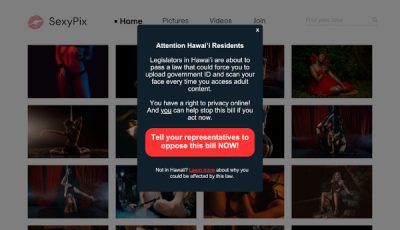Feet of Clay: 18 U.S.C. 2257’s Fall was Long Overdue
 By Hiri David Feign
By Hiri David Feign
Special to YNOT
Nearly a decade after the Free Speech Coalition began a legal battle to invalidate Title 18 U.S.C. § 2257, the Third Circuit U.S. Court of Appeals vacated a lower court’s July 2013 ruling that declared constitutionally valid the federal labeling and recordkeeping statutes pertaining to the adult entertainment industry. In light of two recent Supreme Court decisions, the appellate court remanded Free Speech Coalition v Attorney General to U.S. District Judge Michael M. Baylson’s court for reconsideration on First Amendment grounds. —YNOT.com
2257 is dead. Hallelujah. It’s a brand new day.
The 2257 law held adult content providers responsible for an inordinately burdensome record-keeping process. Its purpose to protect minors from sexual imagery is not something anyone in the adult industry had a problem with. It’s what the paperwork requirements do to free adult speech that’s the issue.
The law is essentially a government program to stifle sexual speech by adults, for adults by miring them in red tape. It leaves adult producers vulnerable to search and seizure at the whim of government officials, threatening producers with federal prosecution not because they potentially harmed children, but because they failed to comply with outlandish record-keeping requirements.
Here’s just some of what makes this law so absurd:
We at the BateWorld World Headquarters are totally behind keeping minors out of our site, and we have systems set up to ensure all members are 18 or older. Images used in site graphics and ads portray men who by no definition of any sensible, sane person could remotely be construed to be under 18 years of age. In each case, the model has specifically consented each time one of their individual images gets incorporated into our graphics, and we keep documentation for all of that.
But we’d still be open to federal intervention and potential prosecution if our record-keeping were to contain anything but a minutely specific formality, beyond the scope of even the largest companies. Every single image requires an insane labyrinth of storage requirements. The records themselves cannot be contained within a file cabinet that contains any other documents. Even the inclusion of other documents or data related to the models, but not required by the 2257 documentation, is a violation of the law.
For example, we’re required to keep records for a photograph from Model X, who has himself given us permission to incorporate his image in an ad. Our in-house consent forms, either digital copies or physical copies, can’t be included in the 2257 documentation folders, but must instead be held in a physically separate location. Our lawyers advised us we actually should keep 2257 documents in an offsite office of their own! When you constantly need to make changes and updates, that’s more than an inconvenience; it invites potential mistakes.
2257 requires a two-page federal form be completed by every performer or model. Each individual photograph must be backed up by specific, individual documentation that must allow for cross-referencing data. Digital spreadsheets are required, but physical forms also are required to have cross-referenced filing systems.
The model forms are fairly simple but require two government-issued IDs. One photo ID and a document with non-photo identification isn’t enough. As you can imagine, this seems intrusive to many people who might otherwise be glad to share their images with us. And you can’t discount the fact it leaves some people unable to participate in adult speech they might otherwise engage in simply because they’ve never been fortunate enough to afford a driver’s license and a passport. Their free speech is curtailed because they don’t have the financial resources. You gotta pay to play.
The constitutionality of this federal legislation has been challenged several times in court. In one case, the law was found to be unconstitutional, but that ruling was later overturned. Now it’s been overturned again, and it’s toast.
I’m especially happy about this new ruling, because as custodian of records for BateWorld Entertainment, I would be the one indicted. Me personally. I’ve taken that risk because I believe BateWorld serves a positive role in the lives of many men, and it’s a cause I believe in, but it’s been a terrible weight over my head.
It’s maddening not to be able to truly express ourselves due to regulations that punish sexual speech. Now I feel we can more fully be in charge of our imagery and free of worry about whether adults doing adult things will mean the downfall of our enterprise.
Hiri David Feign is the custodian of records for BateWorld.com and associated websites.
One Comment
Leave a Reply
You must be logged in to post a comment.















I agree completely with the sentiments of this article. However, I think it’s important to point out a few things that might confuse people: First, there is no requirement in 2257 for any two-page form to be filled out. There is no requirement for any form. Many producers create such a form to list models’ various performer and real names, and to have the models swear to the validity of the ID they present, but there is neither a form nor a requirement for a form. Thus inclusion of such a form in your 2257 records could itself be a violation of 2257. Second, there is no requirement to get two IDs from a performer. In fact, because 2257 only requires one ID, inclusion of a second ID in your 2257 records is a violation of the law. I believe getting a second ID is a bad idea. As the author points out, it rules out models who don’t have two forms of ID. It also creates the ability for a prosecutor to question your acceptance of a certain form of second ID or differences between the IDs. If you accept a second form of ID (and I would not), you should keep it completely separate from your 2257 records. Third, 2257 is not, by any means, dead or even near death. This case is a welcome development, but it is only in one federal circuit. Other circuits might find differently. Until the Supreme Court of the U.S. throws the law out or Congress changes it, everyone would be well-advised to keep following 2257 to the letter (even producers in the Third Circuit). Finally, as a side note, one of the easiest ways for anyone, including a prosecutor, to tell if a site is out of compliance with 2257 is to look at the 2257 link on their webpages. There is a very specific requirement that that link must be exactly as follows: “18 U.S.C. 2257 Record-Keeping Requirements Compliance Statement”. So, if your link simply says “2257 Statement” or “18 USC 2257” or “2257 Compliance”, you are already violating 2257 and committing a felony (ridiculous, I know).